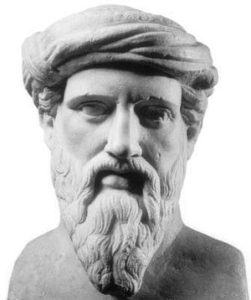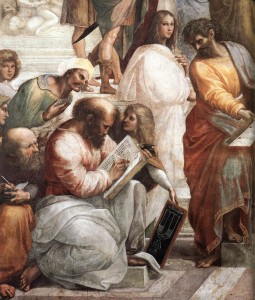
Pythagoras
While Pythagoras has become known as one of the first revolutionaries in the field of philosophy and mathematics, surprisingly little is known about him, as he kept no writings of his own. All that we have learned about Pythagoras and his teachings has come to us indirectly through the writings of others.
What we do know about Pythagoras is that he was born in about 570 BCE. He visited Egypt as a young man and learned extensively about mathematical relations, proportions, and a rudimentary form of geometry. It is believed he studied within the Milesian school that had been founded by Thales a generation before. This school was devoted to uncovering the nature of the universe through objective, non mystical means; and while Pythagoras would not outright disagree with the ideas of Thales, he did take a different approach to exploring metaphysics. To Pythagoras, mathematics was the key. It was the form and order that existed in all things and through it the universe had come into being.
While in Egypt, Pythagoras had learned much about geometry, and he was taught that a triangle with ratios of 3:4:5 would always have a right angle. While this was very useful in fields such as architecture, Pythagoras would go one step further. He uncovered the underlying equation that constituted this observation. Pythagoras was the original intellectual who discovered that the square of a triangle’s hypotenuse equals the sum of the squares of the other two sides.

The Father of Mathematics
This idea is more commonly known by the equation: A²+B²=C². That’s right, Pythagoras was the creator of everybody’s favorite equation from high school math class. This discovery was profound, revolutionary in fact. Never before had a thinker discovered this truth that has been shown to be universally true. This concept was so extraordinary that Pythagoras interpreted it as being divine.
While modern thinkers usually take the line of thought that objective, scientific thinking is contradictory to religion, Pythagoras took quite the opposite position. His foray into mathematics lead him to believe that numbers and mathematical relations held a particular divinity that could explain the universe. To Pythagoras, all the universe was constructed of mathematical relations, and so the cosmos themselves could be explained by the study of numbers.
Pythagoras hypothesized that before the universe there existed infinity with no limits or structure. God would then have created a limit upon all things so that infinity would be able to take on an actual size. In this way a measurable unity was created from which all things formed. The Pythagoreans held so much faith in numbers that they actually started applying characteristics to them. They believed that even numbers were “good” and odd numbers were “evil”. While Pythagoras might have gotten a bit carried away on that point, there is still much support to his claim that the natural world is governed by mathematical relations.

Pythagoras in “The School of Athens”
Pythagoras studied harmonics and learnt that much of music was governed by consistent mathematical ratios. It was said Pythagoras was given inspiration while passing a blacksmiths shop. One blacksmith had an anvil half the size of the other, and the sounds that were produced when the hammers struck were exactly an octave apart. Pythagoras experimented with musical strings and realised that there was a constant ratio between the sizes of strings that determined if they were harmonious when plucked together. This idea would become known as the harmonic series and would become very important in the fields of harmonics and even music.
Pythagoras gained quite a following during his time on earth. The Pythagoreans, as they would be known as, set up a structured community in Croton, southern Italy. This community of 300 people lived by a structured set of rules and standards. Pythagoras was the community leader and taught his ideas of mathematics and divine structure to all who would listen. This community was said to have verged on a cult, as people living together, worshiping numbers certainly would appear to be sect-like. In fact, it was told that this group of Pythagoreans were the subject of much hostility and were eventually run out of town. Pythagoras and his followers were eventually forced to settle in Metapontum, also in southern Italy.
“Number is the ruler of forms and ideas” -Pythagoras
Pythagoras remains one of the most influential thinkers of ancient times. His belief that the cosmos were governed by mathematical forms would be built upon by later astronomers, including the famous Galileo. Additionally, the idea that the natural world was built upon predictable ratios was used by English chemist John Newlands, who discovered that when chemical elements were ordered by atomic weight, those with similar properties occur at every eighth element. This would lead to our understanding of the periodic law of chemical elements that is still used today.
Pythagoras believed in reason above all else. He came to believe that all the universe was governed by mathematical laws. To him, the very structure of the cosmos, existence and even God was possible only through numbers. He was a man whose influence would be felt for centuries to come. He remains one of the fathers of mathematics and one of the most important of the ancient philosophers.












11 comments
Very well written! Told me things I did not know, or had forgotten. Explained things I had no understood when I was young, and merely skipped over in the business of growing up. Thank you very much.
Very interesting article; the section of Pythagoras’s cult was especially so. A well written article about an amazing philosopher. To an extent I would have to agree with him on his ideas.
Pythagoras was not the first person to discover that the squares of the legs or a right triangle equal the square of the hypotonuse. It had been done in China, India, and Babylon years before.
Further reading check “Homage To Pythagoras”
“Rediscovering Sacred Science”
Compilation by Christopher Bamford & 5 other authors Lindisfarne Press
You will be amazed at all the things no one ever mentions about Pythagoras… or what ever his name was.
Actually, it was a political society and not a cult. The political theories of Pythagoras favoured the establishment of a ‘governing of the few’ who were also the best, in short a true aristocracy, which he thought to be the best possible form of governing. The maintenance of such an aristocracy depended not so much on the external aspect of ruling or on keeping a firm grip upon power through dynasty, but rather on its members practicing a certain way of life, which enabled them to develop as individuals beyond the measure of the common man, into a realm where virtues (like self-restraint, courage, prudence) along with a higher, spiritually-oriented intellect, were possible to be successfuly cultivated.
that is cool
i love this website i love social studies
I plan on presenting a workshop at our local Physics Section on “The Egyptian Rope Trick” Showing how the “Rope Benders” used the area of the two sides to get the area of the third side. Once you formed the area, one of the sides is the value of the cube, therefore the length of the hypotenuse.
A practical use of the equation is a rolling off-set in pipe fitting. Very useful, Thanks
I don’t think he is real it can just be a myth
Pythagoras surely has a purpose in the history of today. He also contribute to the foundations of Spiritual Numerology which facilitates in the process of worldwide ascension, self-awakening, and finding your divine life purpose in life… It’s amazing to know that numbers are a part of the Universal Vibration because geometry does reflect in everything such as the multiplication of our cells, flowers, and even the spiral of a galaxy. The Golden Ratio goes into this even more. There is a flow to everything, and your name and date of birth reveals your personal vibration, allowing you to tap into the unseen energies of the Universe, which provides answers into the direction of your soul’s mission. This link here http://kerileesophia.blogspot.com/p/blog-page.html goes into depth about using numbers to find your purpose.
Our apologies, you must be logged in to post a comment.